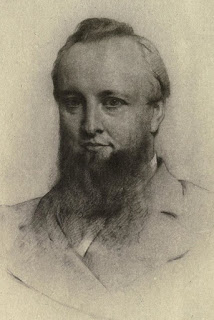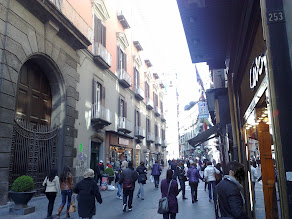Gladstone’s friend and adviser became an Italian Marquess
 |
| John Dalberg-Acton became an MP when he was 29 years old |
He was brought up as a Roman Catholic and was later denied entry to the University of Cambridge because of his religion. He is best remembered for the quote, ‘Power tends to corrupt, and absolute power corrupts absolutely’, which he once wrote in a letter to an Anglican bishop.
Dalberg-Acton’s grandfather was Sir John Francis Edward Acton, who had been appointed by Queen Maria Carolina of Naples to reorganise the Neapolitan navy. His ability impressed her so much that she made him commander-in-chief of both the army and the navy of the Kingdom of Naples and he became Minister of Finance and eventually Prime Minister.
His father was Sir Ferdinand Richard Acton, who had the Villa Pignatelli built on the Riviera di Chiaia in Naples. Dalberg-Acton was born in the villa to Sir Ferdinand’s wife, Maria Luisa Pellina de Dalberg, who was from Germany. The baby was baptised the next day in a small chapel in the villa.
Dalberg-Acton was brought up to speak English, Italian, French and German. His father died when he was three years old. Three years later his mother married Lord George Leveson, later known as Earl Granville, and the family went to live in Britain.
Refused entry to Cambridge, Dalberg-Acton went to Munich to study at the Ludwig Maximilian University of Munich. He stayed in the house of the theologian Johann Joseph Ignaz von Dollinger, who inspired in him a deep love of historical research.
 |
| The Villa Pignatelli, where Acton was born, with today's modern Naples skyline in the background |
By then Dalberg-Acton had become a close friend and adviser to the Prime Minister, William Ewart Gladstone, and he was made a peer at Gladstone’s instigation by Queen Victoria in 1869.
As Lord Acton he became the editor of the Roman Catholic monthly paper The Rambler. Between 1866 and his death, he was a prolific writer on history and religion and published many books. In 1870, he travelled to Rome to lobby against the doctrine of papal infallibility.
In 1872, he was given the honorary degree of Doctor of Philosophy by the University of Munich. In 1888, Cambridge gave him the honorary degree of Doctor of Laws and in 1889 Oxford made him Doctor of Civil Law.
In 1888, he succeeded to the title of Marquess of Groppoli following the death of his cousin, Maria Brignole-Sale, Duchess of Galliera.
Lord Acton was appointed Regius Professor of Modern History at Cambridge in 1895.He delivered two courses of lectures on the French Revolution and on Modern History. He edited the first series of the Cambridge Modern History but did not live to see it published.
He died at the age of 69 at his wife’s family home in Bavaria in 1902. His 60,000-volume library was given to the University of Cambridge.
 |
| The pedestrianised Via Chiaia is one of Naples's smarter shopping streets |
The Riviera di Chiaia in Naples, where Lord Acton was born at his family’s villa, is a long street running along the city's waterfront, approximately between Santa Lucia and the port at Mergellina. The Villa Pignatelli was commissioned by Ferdinand Acton in 1826 as a neo-classical residence that would be the centrepiece of a park. It now houses a coach museum and a collection of 18th and 19th century English and French vehicles. Chiaia itself is one of the wealthiest districts in Naples, home of the city's most upmarket fashion shops and a number of luxury hotels, as well as the area's most prestigious private schools.
 |
| A typical example of the countryside of the Groppoli area, close to Pistoia in Tuscany |
The Marquessate of Groppoli, which Lord Acton inherited in 1888, was originally an Imperial fief and later became a fief of the Grand Duchy of Tuscany. It covers an area of 12 square kilometres in the countryside north of Pistoia. It was sold to Francesco I de Medici in 1577. Ferdinando I de Medici granted the marquessate to Giulio Cibo-Sale, whose only daughter, Geronima, married into the Brignole family. Her son, Anton Giulio, who took the name Brignole-Sale inherited it. Maria Brignole-Sale was the last of the line and on her death, it was inherited by her cousin, Lord Acton, who became the 13th Marquess of Groppoli.
Also on this day:
49BC: Caesar led his army across the Rubicon river, sparking a civil war
987: The death of San Pietro Orseolo, a former Doge of Venice who became a monk
1890: The birth of silent movie star Pina Menichelli
1903: The birth of sculptor and car designer Flaminio Bertoni
1959: The birth of football manager Maurizio Sarri
2009: The death of publisher Giorgio Mondadori
No comments:
Post a Comment